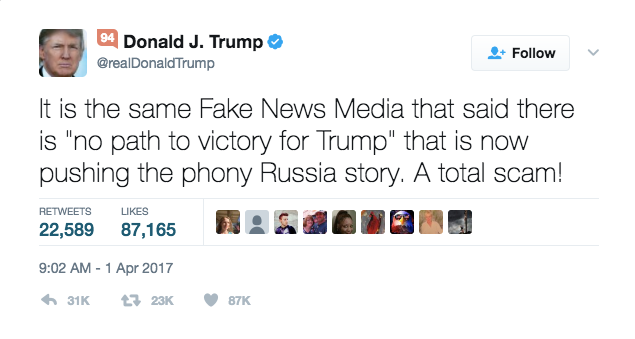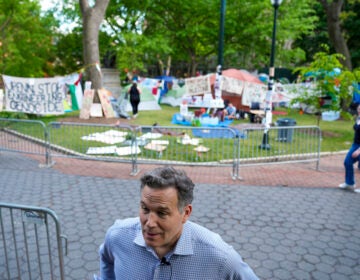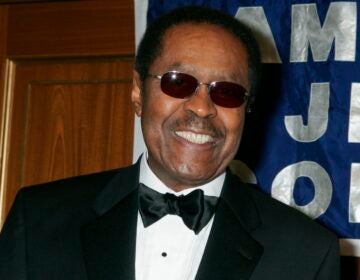In the fight against ‘fake news,’ we are all responsible
Anyone who has been in any profession other than priestly confessors knows that telling the truth, the whole truth, and nothing but is more the exception than the rule.

In this April 1, 2017, tweet, President Donald Trump shares his opinion about the news media and what he calls 'fake news.'
Join WHYY and NPR host Joshua Johnson on May 9, along with columnist Christine Flowers, AP reporter Errin Whack, journalism entrepreneur Christopher Wink, and neuroscientist Dr. Emile Bruneau for “The Search for Truth in an Age of Fake News.” Panelists and guests will unpack the issue of fake news and media literacy and discuss how we can all be more critical news consumers. Registration is free.
—
Whisper Down the Lane was one of my favorite games as a child. It was fascinating, even at the age of 7 or 8, to see how words and meanings could be changed so drastically when passed from ear to ear, through the human prism. It was a kindergarten version of Rashomon, except that instead of giving different views of the same facts, the facts themselves became altered and transmogrified.
And then I grew up and learned that even though I could have my own opinions, I was not, as the great Sen. Moynihan once said, entitled to my own facts. There was black and white, true north and south, heaven and hell — and they were all part of life’s reality.
But then it changed all over again. I went to law school, and was taught how to take some facts and modify others to persuade a judge or jury that what they thought they saw hadn’t really happened. The guilty could be washed in the opaque water of “zealous advocacy,” and come out blameless. It was an education, and I realized that life could be another extended game of Whisper Down the Lane, this time for grownups.
That’s why I’m not really shocked at the supposedly new phenomena of “fake news” or “alt facts.” To be honest, I find this near-hysteria about the manipulation of truth to be a bit overwrought, as if America were waking up for the very first time to the possibility that our neighbors — and we ourselves — are capable of half-truths. Anyone who has been in any profession other than priestly confessors knows that telling the truth, the whole truth, and nothing but the truth is more the exception than the rule.
I know that will anger some people, amuse others, and perhaps make sense to a few others who are honest enough to admit that this preoccupation with “fake news” has a lot to do with the election of Donald Trump. We didn’t start hearing about this apparent epidemic in the media until sometime after the primaries last year, although it ramped up during the general campaign.
This is not to say that Donald Trump and his supporters have not engaged in subterfuge and manipulation of the news, or that Hillary Clinton and her supporters had been injected with truth serum. There was misrepresentation on both sides of that political divide. But it does seem that the angst, the horror and the anxiety that is associated with the prospect of “fake news” took on a new, heavy significance with the election of Trump. The narrative of “alt facts” was born around the same time that reports of hate crimes increased, and I think that this is not exactly coincidental. I’ll get to that in a moment, but first I need to address the whole premise that Lying Is The New Black.
I think that we are blessed with a free press second to none in the world. As an immigration attorney, I have handled the asylum cases of those who have been persecuted because of their political activities. I have also met with journalists who have lost their livelihoods, and much more, because of their insistence on ferreting out the truth and shining a light on corruption. These people do not just face the ridicule of a tweet-happy, heavy-thumbed president. They face prison, beatings, or possible death.
Knowing that this occurs in the world, and that it does not happen here (yet) makes me less sympathetic to claims that the media are being muzzled in the United States. They might be insulted by a loutish president and his arrogant White House minions, as recently happened to the great John Dickerson, but they are not in any real danger. It is on them if they fail to perform their jobs and honor the First Amendment.
But it’s not only the fault of journalists and other media types if the public is misinformed. To paraphrase Cassius, “The fault, dear citizens, is not in our star reporters, but in ourselves.” In other words, I have little sympathy for the readers and consumers of news who say that they can’t distinguish between what is real and what is fabricated. It is up to each American who cares anything at all about his country to vet the information that he receives on a daily basis. Relying on dubious websites simply because you like the partisan flavor is fine if you want to be a cheerleader for your team. However, it’s a pretty poor way of being a valuable and informed member of society.
Which brings me to social media. I have Facebook and Twitter accounts, which I use on a fairly regular basis. I used to have an Instagram account for about three days, and then deleted it because I realized no one cared what my four cheese omelette from the Llanerch Diner looked like. These accounts have allowed me to reconnect with old friends, and make new ones. For that I’m grateful.
Beyond that, however, I think that these outlets can do more harm than good if they represent the primary source of information that the user consumes. Social media, especially when wielded by a prickly president at two in the morning, is wholly unreliable.
And that brings me to the alleged spike in hate crimes. I know I will get a lot of pushback on this, but I have seen far too many cases of alleged “hate crimes” revealed as, well, fake news. Swastikas that were drawn by mentally troubled youths who hated Trump. False claims of hijabs being ripped off the heads of young Muslim women. Rapes that never happened.
This is also fake news, but somehow we’ve been conditioned to believe that anything critical of Trump must be true, and anything that comes from his administration must be false. I have a problem with that, just as I have a problem with the idea that we are dealing with a new phenomenon, and that we are all just one step away from reading Pravda (yes, that was an attempt at irony if you were watching).
In the end, I think that we are responsible for our own education, and we can’t blame the media, the White House, the “resistance,” or even social media for our ignorance. We have eyes, ears, brains, initiative, and reason. Using them will be the best talisman against the dark magic of “alt facts.”
WHYY is your source for fact-based, in-depth journalism and information. As a nonprofit organization, we rely on financial support from readers like you. Please give today.




